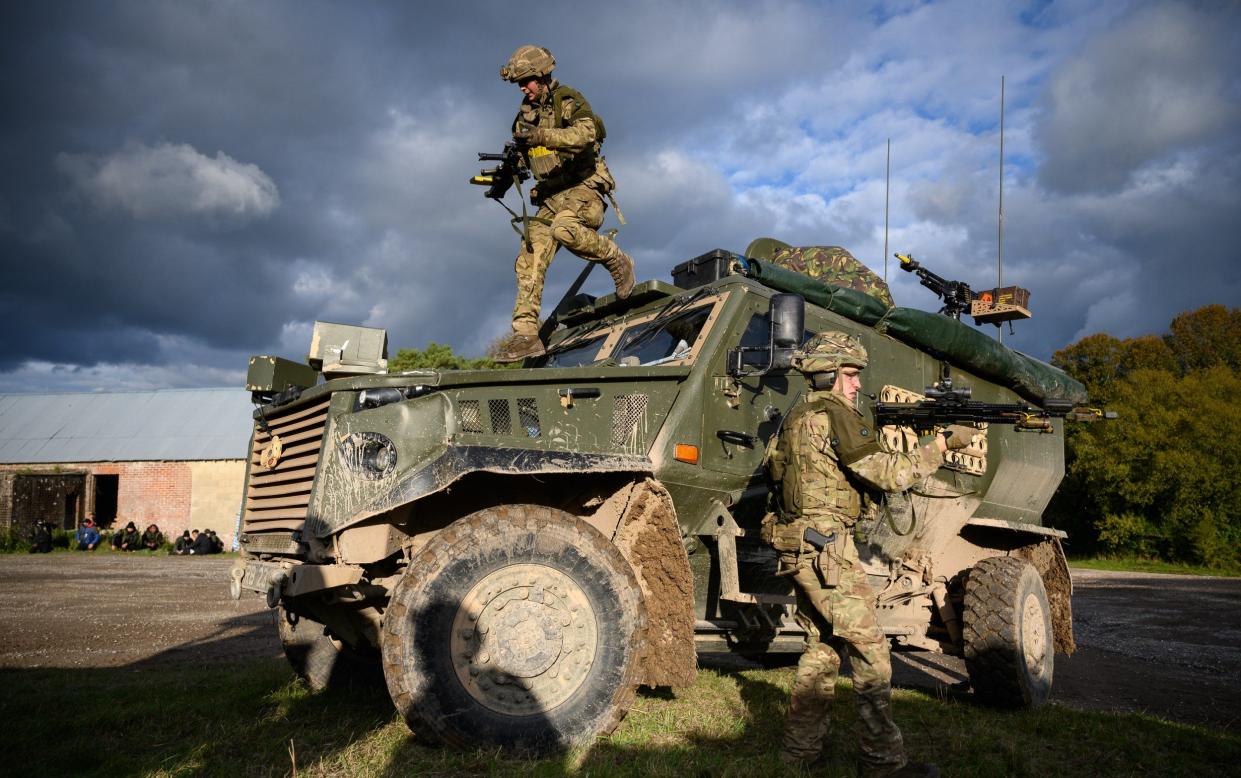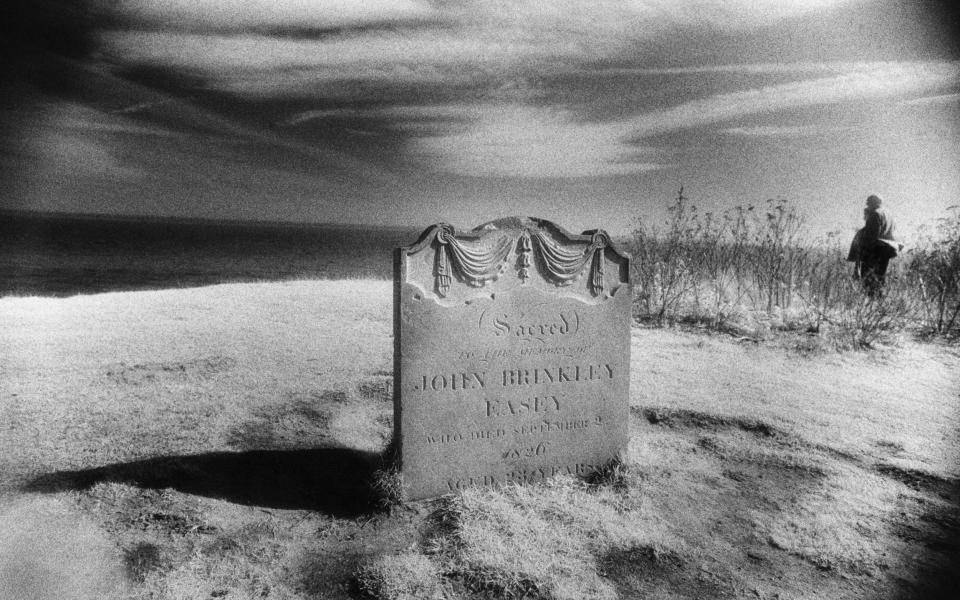Letters: Russian aggression highlights the need to restore Army manpower

- Oops!Something went wrong.Please try again later.
SIR – Your Leading Article (June 28) is a salutary reminder of the need to revisit the call in last year’s defence review for “a modern army that is more agile, more integrated and more expeditionary”, achieved through digitisation rather than numbers.
While digital transformation remains relevant, the need to refocus on our European backyard puts the spotlight firmly on numbers – particularly the plan to limit the Army to 73,000 regulars and 30,000 reserves, with a commensurate reduction in heavy armour.
Four months on from Russia’s invasion of a sovereign nation – and given Boris Johnson’s cheerleading for Ukraine at the G7 meeting, as well as Nato’s decision to increase high-readiness forces to 300,000 – the credibility of Britain’s contribution to thwarting Vladimir Putin’s ambitions is at stake.
However dire the economic outlook, the Government must reorder its defence priorities. This will include: reversing Army personnel cuts so that at least one full-sized armoured division can be fielded and sustained; rapidly procuring a range of equipment (including off-the-shelf items where current programmes have failed); and building up adequate stocks of materiel.
This will be a long haul, and the Prime Minister must prepare the population for the sacrifice involved.
Brigadier Rod Brummitt (retd)
Bournemouth, Dorset
SIR – I welcome the announcement by the Chief of the General Staff that the Army must put itself on a war footing to deter further Russian aggression.
However, the reality is that repeated cuts to our Armed Forces have left them almost unable to meet this goal. Even if defence spending rises to 2.5 per cent of GDP, it will be years before that translates to increased capability.
Successive governments have used the peace dividend after the Cold War to divert funds away from the military. Now we are exposed.
Lt Col Jeremy Prescott (retd)
Southsea, Hampshire
SIR – What atrocity committed by Russia will trigger a military response from Nato?
The longer Russia is left unchallenged by the West, the more emboldened Mr Putin will become – and the longer the war carries on, the greater the response will have to be.
If we continue to sit on our hands and allow Ukraine to be destroyed, what will Russia do next?
Martin Powell
Wysall, Nottinghamshire
SIR – The United Nations was created at the end of the Second World War to prevent further wars. It is an honour to be one of the five permanent members of its Security Council.
The time has surely come to reconsider Russia’s position as one of those members, given the atrocities it has committed – and, in many cases, denied – in Ukraine, as well as in Syria.
The current state of affairs is no longer tenable.
Patricia Gordon Duff
Bristol
Doctors’ strikes
SIR – Under the guidance of the politically motivated British Medical Association, some doctors are threatening to strike over a demand for a 30 per cent pay rise, calling it “right, just and moral” (report, June 28).
With the NHS having become almost a Covid-only service for more than two years, and with face-to-face appointments still difficult to get, this scarcely believable demand is totally wrong, immoral, and unjustified.
The BMA is correct in thinking that the public will consider it outrageous.
Martin Henry
Good Easter, Essex
SIR – I have no problem with doctors turning back the clock to restore their pay to the equivalent of what it was 15 years ago. However, in return, their responsibilities from that time should also be restored.
They should provide 24/7 care for patients (relieving A&E departments as a result), as well as home visits, and most importantly offer face-to-face appointments within 72 hours to anyone who wants or needs one.
The deal they want must cut both ways.
Tony Foot
Mosterton, Dorset
Tory defections
SIR – Some Conservative MPs believe they will lose their seats at the next election if they do not defect (report, June 28).
I had thought all these years that the purpose of my vote was to elect a representative of the people, but it seems I was wrong. Clearly the true purpose of an election is simply to provide a career path for the candidates, who are then free to move to another party at any time that suits their future prospects.
I had better go back to the classroom.
David Pound
Daventry, Northamptonshire
Thatcher and Scotland
SIR – I agree with Nicola Sturgeon that Margaret Thatcher would endorse a second independence referendum (report, June 27) – but she would have insisted that Barnett formula payments were halted for, say, a couple of years before any vote, so that the Scottish people could understand what the loss of English financial support would mean for an independent Scotland.
I doubt Ms Sturgeon would win a referendum if Scottish taxpayers had to pay for the freebies doled out so liberally by the SNP, and the independence cause would be extinguished for ever.
Michael Edwards
Haslemere, Surrey
Wimbledon racket
SIR – The late, great cricket commentator Richie Benaud used to say: “My mantra is: put your brain into gear and if you can add to what’s on the screen then do it, otherwise shut up ... The key thing was to learn the value of economy with words and to never insult the viewer by telling them what they can already see.”
An idea for Wimbledon, perhaps (Letters June 28).
John Wilkins
Ware, Hertfordshire
SIR – Here in France we have eight television channels showing Wimbledon without gabby commentators in either French or English. Bliss.
Andrew J Morrison
Bellevigne-en-Layon, Maine-et-Loire, France
MS drugs on the NHS
SIR – There are sadly very few treatments available to manage the painful and disabling symptoms of multiple sclerosis (MS) – a progressive neurological condition affecting 130,000 of us in Britain. So I was very disappointed to hear that the National Institute for Health and Care Excellence (Nice) has rejected fampridine for use on the NHS in England.
Fampridine is a licensed, potentially life-changing drug that has been proven to improve walking ability significantly for some people with MS. Having been diagnosed with the condition in 1996, I started taking fampridine in 2012 as part of a clinical trial, and thankfully have been able to continue on it – although new patients cannot. The drug has had a profound impact on my movement, ability to walk and overall quality of life.
My MS made it impossible to continue as MP for Penrith and the Border, but having access to fampridine has meant that I could take on other roles that I love such as deputy chair of Natural England and a member of the Council of Europe. These positions require regular visits to reserves and conservation areas, as well as trips abroad. Put simply, without fampridine my working life would cease to exist.
I have been fortunate to continue to access fampridine through the trial (a privilege shared with those in Scotland and Wales who can get it free on the NHS). It’s unfair that the same freedom will not be afforded to others in England following its rejection by Nice on the basis of cost.
The Government’s National Disability Strategy emphasises the importance of helping disabled people get into and remain in work. Yet many people are being denied access to a treatment that has a significant impact on the ability to work, care for themselves and others, and maintain a social life.
Everyone deserves access to effective treatments for MS, no matter where they live in Britain. It’s high time that the NHS in England and the manufacturer work together to find a solution to make fampridine available to everyone who can benefit.
Lord Blencathra (Con)
London SW1
A thriving community lost to coastal erosion

SIR – Harry de Quetteville (Features, June 25) highlights the threat of coastal erosion.
We have continually ignored the signs of rising sea levels. Our coastline has been changing across the centuries, one fine example being Dunwich on the Suffolk coast. This was a thriving medieval port in 1086 with more than 3,000 residents, but it is now long submerged beneath the sea, as are nine churches lost across subsequent centuries.
David Saunders
Pembroke Dock
SIR – Some 400 years ago Britons started to reclaim land from the sea, Romney Marsh being one example.
Sometimes the Dutch helped (particularly in the Cambridgeshire and Lincolnshire fens). If we can grab land from the sea and hold on to it, why can we not prevent coastal erosion and protect the land behind it?
The Dutch do not seem to have a problem with longer stretches of “artificial” coastline.
John Hinton
East Bergholt, Suffolk
Would tighter cycling rules ever be enforced?
SIR – Rosie Harden-Vane (Letters, June 28) asks how the licensing of bicycles would be enforced. If my recent experience is anything to go by, it wouldn’t be.
Last week I made a rare visit to Derby city centre, where I saw two e-scooters being ridden at speed in a pedestrianised area. There were police officers on patrol nearby, so I asked them if they were aware of the e-scooters. They replied: “We don’t bother enforcing it [the law], unless they are engaged in anti-social behaviour.”
I contacted Derbyshire Police to ask if it is now official policy to ignore the law on illegal e-scooters, and whether putting pedestrians at risk is not “antisocial behaviour”. I await a reply.
Terry Lloyd
Derby
SIR – When I was growing up in Belgium in the 1970s it was a legal requirement for all bicycles to display a tin licence plate at a nominal cost.
This caused only the minor inconvenience of having to remember to renew the licence annually, and is an example of one area in which our continental cousins were well ahead of their time.
Mark Calvin
Crickhowell, Brecknockshire
SIR – As regular visitors to Kew Gardens we see the cycle lane on Kew Road with plastic pillars denoting its boundary. Yesterday we saw a cyclist actually using it.
I imagine that at the height of rush hour it might be more populated, but since the width of the lane only allows for one bicycle, it seems inevitable that the speedier cyclist will ignore the lane and weave among the traffic.
Bill Todd
Twickenham, Middlesex
Cheeky pint
SIR – A few days ago I was charged £6 for a pint of bitter at a pub in Sheringham, Norfolk.
Is this a record?
Bob Farey
Kettering, Northamptonshire
Letters to the Editor
We accept letters by post, fax and email only. Please include name, address, work and home telephone numbers.
ADDRESS: 111 Buckingham Palace Road, London, SW1W 0DT
FAX: 020 7931 2878
EMAIL: dtletters@telegraph.co.uk
FOLLOW: Telegraph Letters on Twitter @LettersDesk

